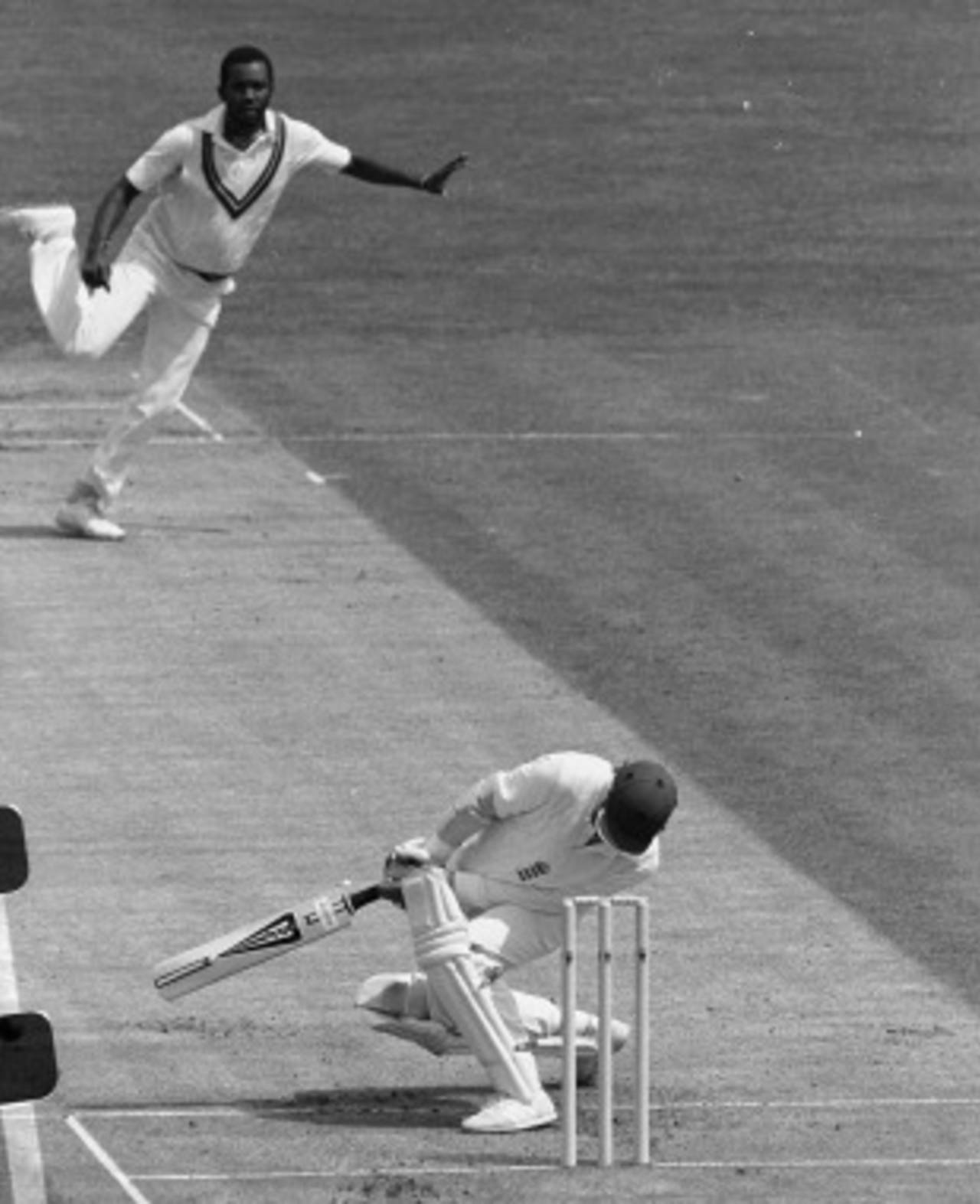Malcolm Marshall, who died in Barbados on Thursday (Nov 4) at the age of just 41, was arguably the greatest fast bowler of the modern era. The records tell us that. But of all the superb Caribbean
cricketers of the last three decades, he was the most consumed by the game and the most committed to maintaining his contact with it at the sharp end - in the nets with the next generation rather than the cosy
commentary box.
Statistics can only hint at the complete cricketer. Marshall was an awesome bowler, generating phenomenal pace from his five foot 10 inch frame - usually reckoned to be too short by modern standards. He could blitz you with sheer pace; he could swing you out if in guileful mood.
He sprinted up to the wicket, barely stopping at the crease to deliver the ball, slightly open-chested but with supple fingers delicately controlling the seam. If necessary, he just kept coming.
Even in his recent role as coach to the West Indian team he couldn't stop himself from bowling countless overs in the nets. No-one was more devoted to the game. His former Hampshire captain, Mark Nicholas,
reckons that he has never encountered anyone with such enthusiasm for cricket. Joel Garner has said: "Malcolm's real strength was that he never gave less than 100% for any side he played in. Palling
his weight for his team just meant everything to him."
These were the qualities that endeared him to colleagues and opponents alike. They were most obviously displayed against England at Headingley in 1984. There he broke his thumb, fielding close to the wicket, and he was promptly plastered up. This was the cue for most professional cricketers to watch the rest of the game from the comfort of the balcony. He was told not to play any cricket for at least 10 days.
Marshall decided otherwise. Not only did he bat one-handed to allow his team-mate, Larry Gomes, to reach his century, but in the second innings, left hand still in plaster, he proceeded to bowl England out taking seven for 53. He seemed indestructible then.
Most cricketers try pretty hard in the Test arena - though Marshall always went the extra mile - and generally the great ones coast a little when returning to the counties. Marshall would never do that
even on a drab day at Bournemouth.
There was a peculiar tension when batting against Hampshire in the 80s. Even when he was grazing at mid-off you were conscious of him; you could not avoid glancing in his direction, checking his
movements: "When is he coming back? How much more of Nigel Cowley will I be permitted? He's had a word with the captain. He's loosening up."
Invariably he did come back and the sternest of challenges ensued. Like all the great West Indians he never said a word to you. There might be the odd glance, an icy stare or a knowing smile, but sledging was demeaning to him - and with such pace in his armoury it was a redundant weapon any way.
"Cappy," he would chime in his slow, high-pitched Bajan accent (when he and Garner were together he speeded up and they were indecipherable to those of us born on this side of the Atlantic), "mid-off's a waste
of time: put him in slips. Square leg to short leg." Then he would glide in at pace or maybe dally with his victim with an assortment of swingers (on balance, I preferred the latter). The contest was fierce
and usually one-sided, but after stumps he would be chucking away with anyone.
There was a peculiar tension when batting against Hampshire in the 80s. Even when he was grazing at mid-off you were conscious of him; you could not avoid glancing in his direction, checking his movements: "When is he coming back? How much more of Nigel Cowley will I be permitted? He's had a word with the captain. He's loosening up."
I played with him four or five years ago, albeit in a charity match at Torquay against a Somerset side. Of course he bowled properly off a dozen paces with the new ball; he produced a mini-masterclass and soon
induced an outside edge. An unknown 16-year-old wicketkeeper, Chris Read, took off to his right to take a stunning catch. How Marshall glowed at the magic he'd created. At the other end Read was
cock-a-hoop that the world's greatest bowler was so overjoyed by the moment.
Thereafter Marshall stationed himself at mid-off alongside budding bowlers. Their chests puffed out and they revelled alongside such a generous tutor. An easy word of encouragement here and there gave them
an unforgettable day. For Marshall, it was natural for him to share his passion and expertise.
In all probability, he would have developed into a great coach. Already there was a limitless demand for his services. He had been successful in Natal, where he captained the side in 1993-94. Shaun Pollock
readily acknowledges his debt to Marshall.
He returned to his beloved Hampshire, where he oversaw a mini-resurgence over the past three years. And he undertook the hardest challenge of the lot: trying to arrest the decline of West Indian cricket. He was hugely frustrated by the players' threatened strike action at Heathrow prior to the South Africa tour 12 months ago - Marshall would have been mystified by their attitude - yet sympathetic to their burden of following the great team of the 80s.
He would have been welcomed with open arms at every venue during next summer's West Indies tour of England. Now, tragically, their side can only be inspired by the memory of his brilliant example of how to play the game.
